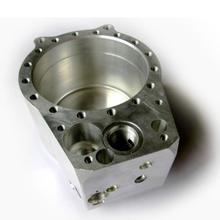Supplier: Injection Moulding Company
Contact person: Mr. Reus Lin
Position:
Address: 8356 W. Sunset Boulevard
Country: United States (USA)
Phone: +1(310)6425869 - Mobi:
Plastic Parts
Price: USD 1500
Noryl resins have not been suggested by now. Noryl resin is also known as modifed PPE (polyphenylene ether) and has a range of HDT's while maintaining excellent physical properties and outstanding flame retardancy. Sabic-IP is the supplier. As mentioned earlier, Ultem resin, another Sabic-IP offering, would be an excellent alternative, albeit also a more expensive one.
There is a pressure sensitive plastic parts product in the market. Check some of the product descriptions in the back of your subscriptions. Yes, hard copy does have a place. The product changes color as a result of pressure. You can use it to measure for similar pressure on the four corners (parallel) of the plattens whan a mould is installed. If you plattens are really off, call the manufacturer service. Unless you do this type of repair work on a regular basis, leave to those who were trained for it.
I have good experience in plastic injection mould business. In Plastic product design and development, first you need to understand about plastic. You should be aware about its pros and cons, and also have the knowledge to bridge the gap between your idea and a mould product.
Almost any thermoplastic will "work" in an application. The key is what does "work" mean? Outline your performance requirements and balance the material cost. Absolutely, PEI will "work" but is that what you really need?
the pressure sensitive plastic parts is one of the tools we provide to process and production engineers across several industries. The corners are a popular way of running the tests you're pertaining to. Some process engineers like to look at the planarity of the mould platens that might be giving them trouble like addressing flashing and parting line issues.
There is a pressure sensitive plastic parts product in the market. Check some of the product descriptions in the back of your subscriptions. Yes, hard copy does have a place. The product changes color as a result of pressure. You can use it to measure for similar pressure on the four corners (parallel) of the plattens whan a mould is installed. If you plattens are really off, call the injection mould manufacturer service. Unless you do this type of repair work on a regular basis, leave to those who were trained for it.
I have found pressure sensitive custom moulds, including those from Sensor Products, to be quite useful and cost effective for static applications. If the pressure profile is required in dynamic problems (such as impact) there are solutions that can handle high pressures, good sampling rates (up to 20,000 frames/second) and fine spatial resolutions (up to 1600 per square inch). These come at a much higher cost though, and are thicker than the pressure custom moulds but can be as thin as 0.1 mm.
There is a pressure sensitive plastic parts product in the market. Check some of the product descriptions in the back of your subscriptions. Yes, hard copy does have a place. The product changes color as a result of pressure. You can use it to measure for similar pressure on the four corners (parallel) of the plattens whan a mould is installed. If you plattens are really off, call the manufacturer service. Unless you do this type of repair work on a regular basis, leave to those who were trained for it.
I have good experience in plastic injection mould business. In Plastic product design and development, first you need to understand about plastic. You should be aware about its pros and cons, and also have the knowledge to bridge the gap between your idea and a mould product.
Almost any thermoplastic will "work" in an application. The key is what does "work" mean? Outline your performance requirements and balance the material cost. Absolutely, PEI will "work" but is that what you really need?
the pressure sensitive plastic parts is one of the tools we provide to process and production engineers across several industries. The corners are a popular way of running the tests you're pertaining to. Some process engineers like to look at the planarity of the mould platens that might be giving them trouble like addressing flashing and parting line issues.
There is a pressure sensitive plastic parts product in the market. Check some of the product descriptions in the back of your subscriptions. Yes, hard copy does have a place. The product changes color as a result of pressure. You can use it to measure for similar pressure on the four corners (parallel) of the plattens whan a mould is installed. If you plattens are really off, call the injection mould manufacturer service. Unless you do this type of repair work on a regular basis, leave to those who were trained for it.
I have found pressure sensitive custom moulds, including those from Sensor Products, to be quite useful and cost effective for static applications. If the pressure profile is required in dynamic problems (such as impact) there are solutions that can handle high pressures, good sampling rates (up to 20,000 frames/second) and fine spatial resolutions (up to 1600 per square inch). These come at a much higher cost though, and are thicker than the pressure custom moulds but can be as thin as 0.1 mm.
SEND INQUIRY
Please fill in fully your information to send email
CATEGORY














 Agriculture
Agriculture